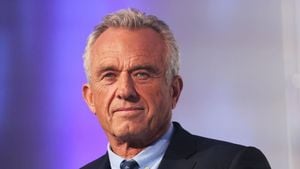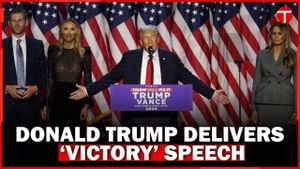Donald Trump, the controversy-loving figure of American politics, is making headlines again, this time with significant potential impacts on foreign policy. After his announcement of key appointments for his incoming administration, questions arise about how these selections will change America’s stance on various international issues, particularly concerning China and Iran.
President-elect Trump recently named Senator Marco Rubio as his choice for Secretary of State and Representative Mike Waltz for National Security Adviser. Both appointments are viewed as part of Trump's continued push for loyalty and alignment with his aggressive stances against some countries. The decisions seem to be crafted to not only resonate with his base but also to send confirming signals to both allies and adversaries.
This shift to traditional, albeit hawkish candidates, could soothe the nerves of American allies worried about the unpredictability associated with Trump's previous foreign policy approach. Notably, China and Iran are bracing for Dubai. Analysts portray Rubio and Waltz as ultra-hawkish, especially when it concerns dealing with China, where both have advocated stringent positions and policies.
Rubio is known for his hardline approaches toward China and Cuba, influenced by his background as the son of Cuban immigrants. His experience as the Senate Foreign Relations Committee member positions him well within traditional diplomatic circles. While Trump has often raised eyebrows globally with criticisms of NATO and admiration for Russian President Vladimir Putin, Rubio’s history suggests he could moderate some of the volatile tendencies previously exhibited by Trump. For example, Rubio was instrumental in ensuring bipartisan agreements to sustain NATO support.
Meanwhile, Waltz, who has been vocal about military strategies concerning China, has also endorsed the hardline view of the Biden administration's support for Ukraine during its conflict with Russia. Both men echo sentiments on security alignments closer to Trump’s ethos, demonstrating readiness to radically re-evaluate U.S. positions on international conflicts and trade.
The appointments are set against the backdrop of previous U.S. foreign policy strategies. Under Trump's initial presidency, tariffs against China were significantly lifted, and there were calls for more stringent trade practices. History may repeat itself, as the anticipated return of fear-based policies might surface stronger with the new cabinet appointments. This approach could devastate U.S.-China relations, particularly as both nations navigate economic challenges intertwined with diplomatic tussles.
Analysts expect this layer of appointments to push harsher measures against Beijing amid concerns around human rights issues, technology theft, and supply chain vulnerabilities. With the ever-evolving tech race and stances over Taiwan, these selections could signal even more rigorous confrontations.
Adding another dimension to the potential foreign policy pivot, Trump has proposed broader measures extending to military funding and defense contracts. Within Trump’s inner circle, the notion of securing American dominance abroad may overshadow previous bipartisan efforts aimed toward diplomatic resolutions.
Advocates for human rights and progressive trade practices worry these new shifts will exacerbate tensions rather than promote peace. Already, the ripple effects are being felt, with key players on the global stage speculating about how this might affect existing alliances and engage adversaries. At this point, uncertainty looms over the prospects for peace as Trump’s selections could prompt fierce international competition placing the U.S. at odds with both enemies and allies alike.
On the domestic front, Trump’s foreign policy decisions are expected to impact trade policies and, by extension, American families and businesses relying on global supply chains. With inflationary pressures still palpable, the need for steady foreign relations is as pressing as ever. How these appointments will translate to tangible benefits or losses for American consumers remains to be seen.
While it’s common for political appointments to invoke debates, Rubio and Waltz represent more than just names on papers; they encapsulate focal points around which much of Trump’s foreign policy will be centered. Activists worry about the potential for aggressive posturing to morph relationships with allies as they navigate through geopolitical concerns, especially around maintaining stability with China and tackling tensions with Iran.
Rubio’s track record suggests potential continuity – and possibly escalation – concerning U.S. tactics against left-leaning governments, which have often been portrayed unfavorably under both arrows of the political spectrum. This creates uncertainty, prompting governments from every corner to assess their positioning concerning the incoming administration.
How these foreign policy ideals are implemented will define the coming years, setting the stage for international relations and domestic consequence alike. With uncertainty now on the horizon, foreign diplomats, analysts, and citizens await clarity on which direction Trump and his cabinet will take the U.S. foreign policy moving forward.
Many are left speculating: Is America gearing up for defiance, or is Trump intent on pursuing paths leading to engagement? Only time will tell, but the stakes for both domestic and foreign players are undeniably high.



